Dying without a Will is called dying “intestate.” What this means is that your intentions as to who inherits your assets, who administers your estate, and who acts as guardians for any young children are determined by the Commonwealth of Massachusetts.

It is often said that if you don’t have an Estate Plan, the Commonwealth has one for you. And as of January 2nd, 2012, the Commonwealth has an updated plan for you! That’s when the last phase of the Massachusetts Uniform Probate Court (MUPC) takes effect. It’s estimated that nearly 65% of American’s don’t have a Will.
Fred is a healthy, vibrant sixty-five-year-old man. He exercises three times a week, and has made a conscious effort to eat well since his recent diagnosis with diabetes. After speaking with many close friends, Lenore, Fred’s wife, insists that they both create Wills. Fred insists that he is perfectly healthy, wishing to leave the issue of Estate Planning until he experiences further health problems. What if Fred was to die without a Will?
If Fred dies without creating a Will, or using some legal method to transfer his assets, Massachusetts Law, specifically the rules of intestacy, determine what happen to his property. After payment of debts, expenses, administration and funeral costs, your property will be distributed to your heirs according to a predetermined legal formula. The problem is that the formula the Commonwealth uses may not end up being how you would like your estate divided. If no relatives can be found to inherit your assets, they are taken by the Commonwealth.
Intestacy distribution, under MUPC, specifies that if Fred dies leaving a spouse with no children and his parents are also deceased, his spouse receives everything. But, the same scenario with Fred’s father alive at his passing, has a very different result where Fred’s wife and father will each inherit from Fred’s estate.
What if Fred passed with a spouse and minor children? Then his spouse would inherit everything, regardless of whether his parents were still living. However, if one of his children was from a previous relationship, his current spouse and ALL of Fred’s children are heirs together and inherit a portion of the estate.
Despite the changes under the MUPC, Massachusetts Wills still have a spousal elective share clause, which means you can’t disinherit your spouse in your Will. In most cases the surviving spouse can elect to get the first $100,000 or $200,000 of the estate, plus a portion of the remaining property, instead of what their spouse left in their Will.
The rules of intestacy may appear confusing and difficult to apply to apply given your unique situation. It is always best to determine how you would like your assets to pass through a properly executed Last Will & Testament, or even a Trust. In this way, you can ensure that family members you are not close with do not end up inheriting through your estate. You may also provide for step-children in the case of blended families.
The best way to truly ensure that your family is protected and that your estate is distributed according to your wishes is to consult with a knowledgeable Estate Planning and Elder Law attorney.

